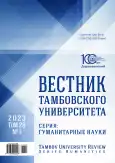Target guidelines for the formation of project activity of students in the conditions of profile training
- Authors: Mosina O.A.1, Danilyants E.I.2
-
Affiliations:
- Kuban State University
- Armavir State Pedagogical University
- Issue: Vol 28, No 1 (2023)
- Pages: 58-65
- Section: PEDAGOGY OF SECONDARY AND PRESCHOOL EDUCATION
- URL: https://journal-vniispk.ru/1810-0201/article/view/297900
- DOI: https://doi.org/10.20310/1810-0201-2023-28-1-58-65
- ID: 297900
Cite item
Full Text
Abstract
In the presented study, the need for the development of project activity of students in a modern professionally oriented high school is determined, and its targets are identified, which make it possible to track the effectiveness of pedagogical activity and personal development of the student. Among the scientific approaches, the practice-oriented approach of D. Dewey and the concept of the “open” school of T.S. Shatsky, which have found application and development in modern scientific psychological and pedagogical discourse, are predominant. The criteria for the formation of project activity: motivational, cognitive, rational, personal, promising allowed us to determine a list of indicators that can be monitored through diagnostic tools, which allows us to develop the conclusions obtained experimentally. The theoretical conclusions made were confirmed by the calculation of the expediency index, as well as by an expert survey of teachers of educational organizations in the number of twenty-eight people. In general, the conducted research demonstrates the need to develop the project activity of students in the educational process, as well as to design the educational process in such a way that the personal development of students becomes more ambitious, professionally oriented and aimed at the personal development of students. The presented results can be applied in the process of research and educational work in higher educational institutions.
About the authors
O. A. Mosina
Kuban State University
Email: kuvshinovaoa@mail.ru
ORCID iD: 0000-0003-3303-6387
Dr. Sci. (Education), Head of General and Social Pedagogy Department
173 Stavropolskaya St., Krasnodar, 350910, Krasnodar Part, Russian FederationE. I. Danilyants
Armavir State Pedagogical University
Author for correspondence.
Email: danilyanc01@gmail.com
ORCID iD: 0000-0001-7778-0672
Senior Lecturer of Economics and Management Department
159 Rozy Lyuksemburg St., Armavir, 352901, Krasnodar Part, Russian FederationReferences
- Alizhanova Kh.A. (2020). Specialized training in the education system. Mir nauki, kul’tury, obrazovaniya = World of Science, Culture and Education, no. 3 (82), pp. 115-117. (In Russ.) https://doi.org/10.24411/1991-5497-2020-00478, https://elibrary.ru/kjfwqr
- Orlova E.A., Begidova S.N. (2015). Essence of project activity of the social orientation of seniors. Vestnik Ady-geiskogo gosudarstvennogo universiteta. Seriya «Pedagogika i psikhologiya» = The Bulletin of the Adyghe State University. Series “Pedagogy and Psychology”, no. 2 (159), pp. 52-56. (In Russ.) https://elibrary.ru/tyyshh
- Goleman D. (1995). Emotional Intelligence. New York, Bantam Books Publ., 376 p. Available at: https://archive.org/details/emotionalintell100gole/page/n11/mode/2up
- Abasov Z.A. (2009). Projecting and organizing students’ group work during the lessons. Nauka i shkola = Science and School, no. 6, pp. 36-37. (In Russ.) https://elibrary.ru/mwhcgf
- Ilin G.L. (2014). The main regulations of the projective education of personality. Nauka i shkola = Science and School, no. 6, pp. 92-97. (In Russ.) https://elibrary.ru/tcvjhv
- Gangani N.T., McLean G.N., Braden R.A. (2008). Competency-based human resource development strategy. Performance Improvement Quarterly, vol. 19, issue 1, pp. 127-139. https://doi.org/10.1111/j.1937-8327.2006.tb00361.x
- McClelland D.C. (1961). The Achieving Society. New York, D. Van Nostrand Publ., Princeton, 514 p. Available at: https://www.perlego.com/book/3019424/the-achieving-society-pdf
- Mosina O.A., Ovakyan V.S. (2021). The positive impact of cognitive activity on a student from a dysfunctional family. In: Mosina O.A. (ed.). Aktual’nye voprosy pedagogicheskoi nauki i obrazovaniya [Topical Issues of Pedagogical Science and Education]. Krasnodar, Kuban State University Publ., pp. 130-134. (In Russ.) https://elibrary.ru/dzkzhr
- Saieva L.Kh. (2018). Project activities in the education of social activity of students. Mir nauki, kul’tury, obra-zovaniya = World of Science, Culture and Education, no. 3 (70), pp. 271-272. (In Russ.) https://elibrary.ru/lxgpkt
- Shcherbakova S.G. (2019). Proekty na urokakh khimii: vidy i vozmozhnosti [Projects in chemistry lessons: types and possibilities]. Uchebnyi god [Academic Year], no. 1 (54), pp. 70-71. (In Russ.) https://elibrary.ru/zyrpqt
- Dirivyankina O.V., Matais M.I. (2016). Psychological barriers and the influence of external factors on adoles-cents in process of socialization. Istoricheskaya i sotsial’no-obrazovatel’naya mysl’ = Historical and Social Educational Idea, vol. 8, no. 5-3, pp. 68-71. (In Russ.) https://elibrary.ru/xhcwev
- Abdulshekhidova Kh.E. (2016). Poznavatel’naya aktivnost’ mladshikh shkol’nikov v proektnoi deyatel’nosti. Uspekhi sovremennoi nauki = Modern Science Success, vol. 1, no. 12, pp. 118-119. (In Russ.) https://elibrary.ru/xilczz
- Ribe R., Vidal N. (1993). Project work. Step by Step. Oxford, Heinemann Publ., 96 p. Availible at: https://rusneb.ru/catalog/002676_000027_IRKNB-RU_ИОГУНБ_HOBBIT_74.261.7Англ_R52-927111/
- Phillips D. (1999). Projects with Young Learners. Oxford, Oxford University Press, 180 p. Availible at: https://knigogid.ru/books/1497121-projects-with-young-learners/toread/fragment?update_page
Supplementary files








